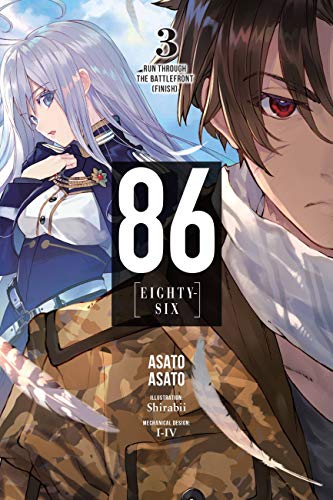By Asato Asato and Shirabii. Released in Japan by Dengeki Bunko. Released in North America by Yen On. Translated by Roman Lempert.
It’s only taken a few volumes for this to rise to near the top of my list of favorite Japanese light novels, and there are several reasons for it, but I’ll focus on one here: the author is very good at strong, memorable set pieces. I’ve talked before about how the most ordinary ideas can become magic with good writing and strong characterization, and that’s true here as well, though given the books we’ve seen lately trying to ape 86, perhaps the ideas aren’t that ordinary. But the best light novels also have one or two scenes that blow the reader away, something that when you are recommending the book to someone else you cannot help but gush over. 86 is particularly good at this, and there’s more than one in here, both dramatic and horrific. (If you’re looking for humor, this is not the series for you.) But a conversation between Shin, our hero, and Lerche, who is… well, a spoiler, upends the entire picture of what war is to an 86, and how war should be fought. Because don’t forget the main thrust of this series: war is awful.
The 86 and Lena are sent to the United Kingdom, which is a bit on the nose for books like these, but hey – which is also battling the Legion, and is now desperate enough to call in France… erm, the Federacy… because they’re running out of time to fix things. Fortunately, they have another genius to help guide the combat in Prince Vika, who will be leading an army of young women who are dead soldiers who have been resurrected, sort of, as essentially androids. They are there to fight the war, and are happy to do so, given that they’re not actually alive. The 86 find this a bit disturbing, but also do not seem to see the parallel between these girls and themselves. As for Lena, well, she’s still struggling with several issues – she still can’t understand Shin and tends to lean towards pity, that face that she’s clearly from the Republic earns her hatred, and perhaps worst of all, she’s forced to wear a skin-tight suit in order to better communicate and lead the soldiers under her command.
The last part is probably the one low point in this book – you get the sense the editors ask for one fanservice scene per book that they can hand to the illustrator. The high points in the book are numerous. The battles are vicious and nasty, with the Legion proving to be exceedingly clever even though they lack a personality. The way that the Sirins solve the problem of the siege is mesmerizing in its grotesqueness. There’s a secondary romance in this book starting between Anju and another soldier that manages to get farther than Shin and Lena have in five books. Indeed, by the end of the book they seem farther apart than ever, as Shin realizes that he knows absolutely nothing about Lena. But the highlight, as I said, is that scene between shin and Lerche, where Lerche, despite seemingly being an automaton, gradually grows more furious hearing about Shin vowing to continue the fight because if they let others fight for them they’d be “cowards”. It is, in its own way, an argument between two tools. But only one of these tools can stop being one and become human again.
This is still a brutal series, and if you dislike war-filled battlefields you may want to skip it. But it’s seriously one of the best books currently coming out, and I can’t wait for the 6th volume.


